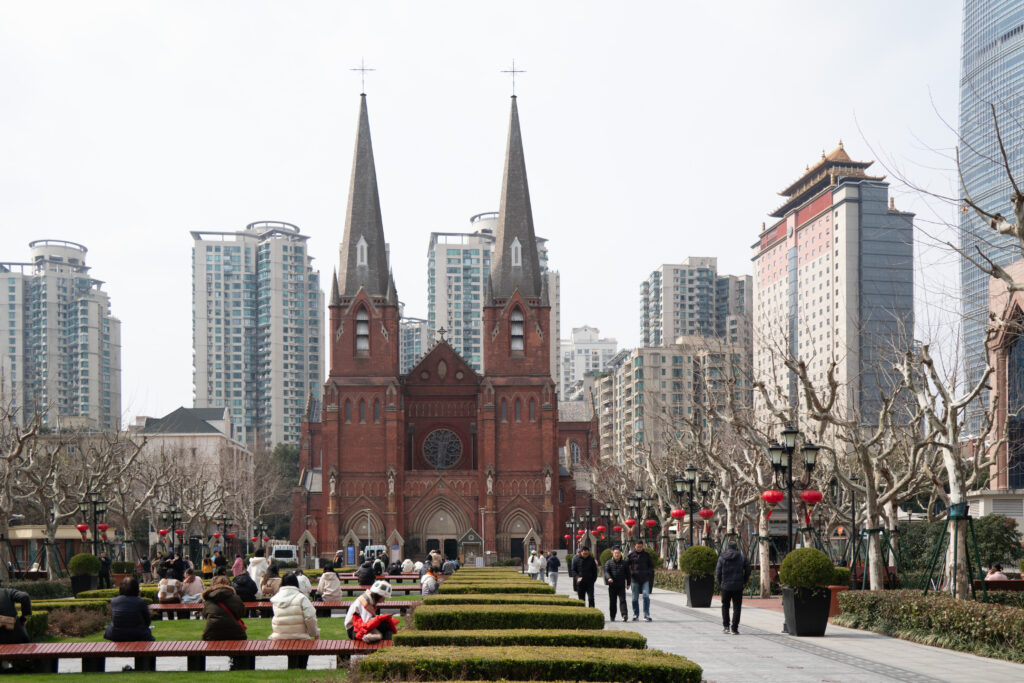Contrary to its depiction as an external influence, Christianity is deeply woven into modern China’s historical, cultural and political tapestry. Its presence has been notable in various pivotal movements, from the Taiping and Boxer Rebellions in the 19th century to the Christian presidents Sun Yat-sen and Chiang Kai-shek during the Republic of China era.
Yet, after the Communist Party established and consolidated its rule in the mid-20th century, the state’s approach to Christianity changed significantly. There were periods, particularly during the political campaigns between the 1950s–70s, when Christianity faced severe suppression due to its perceived ties with imperialist forces. But the intensity and nature of such suppression has fluctuated, reflecting a complex interplay of historical and political dynamics in the first three decades of the People’s Republic of China.
The post-Mao Zedong era marked a significant shift, with China gradually easing religious restrictions. This period saw a remarkable surge in Protestantism, from 3 million adherents in the early 1980s to an estimated 38 million by 2018. But this revival introduced a critical dilemma. The state mandated religious groups to register, a stipulation many view with apprehension.
Many Chinese Protestants seek a degree of independence from official oversight by choosing not to participate in the state-sanctioned Three-Self Patriotic Movement. But this stance comes at a cost. These independent churches frequently encounter barriers to securing the necessary state approvals for formal worship spaces, leaving them without the right to host congregations in designated religious buildings.
Consequently, gatherings in private homes or other informal settings — a tradition among non-Three-Self Patriotic Movement churches that dates back to the People’s Republic of China’s early years — persist among many Chinese Protestants. This method of assembly is known today as the ‘house churches’ movement in China.
Confronting a landscape marred by nebulous and frequently antagonistic religious policies, some house church leaders and members assert worship rights and champion the cause for a distinct separation of church and state. Practically, many safeguard their places of worship with protests and collective actions. Intellectually, some promote a vision of societal transformation through theological arguments.
House churches, rooted in a profound desire for spiritual autonomy, often find themselves in a delicate dance with local authorities. At the heart of this tension lies a fundamental conflict over space, resources and the unconstrained practice of faith. Some house churches’ steadfast refusal to register with the state, a stance born out of a commitment to preserving their independence and a broad interpretation of the freedom of religious belief outlined in the People’s Republic of China’s Constitution, frequently sets them on a collision course with governmental forces.
This clash is not just a bureaucratic skirmish but a profound existential struggle for these communities. They navigate a complex matrix of legal ambiguities. The ‘anti-church’ campaign in Zhejiang province in the mid-2010s, during which crosses on church buildings were demolished, is a poignant example of this struggle. In this high-profile confrontation, house church members mounted a robust defence of their spiritual emblems and spaces. Through petitions, protests and online advocacy that spread their cause across the digital sphere, they showcased a collective spirit of resistance that resonated far beyond their immediate community.
Activism among China’s house churches reflect not just a reactive stance against specific grievances but a proactive engagement with the concept of religious freedom itself. House churches implicitly call for re-evaluating the relationship between the state and religious institutions in China by advocating for the right to practice their faith as they see fit. They posit a model of religious engagement that insists on respect for constitutional protections and nurturing a pluralistic society where diverse faiths can coexist without fear of state interference.
Figures such as Wang Yi, a prominent house church leader who is currently jailed in China, epitomise this form of religious activism. Drawing from a wellspring of Calvinist theology, Wang and his followers leveraged their influence to steer their congregations into the realm of social activism. Wang’s publications and speeches explicitly criticise the government’s tight grip on religious affairs and question the foundation of the state’s approach to governance and religious practice. His activism is rooted in a vision of a society where religious groups operate independently of state control, advocating for a constitutional reinterpretation that respects the sanctity of religious freedom.
By advocating for a separation of church and state, house church leaders like Wang contribute to a broader dialogue on human rights, legal reform and the role of religion in public life. Their efforts challenge the status quo, underscoring the potential of faith-based communities to influence sociopolitical landscapes.
The 2018 raid on the Early Rain Covenant Church and the nine-year sentence given to Wang at the end of 2019 highlights the risks faced by house church activists. These events are a testament to the enduring tension between state control and the quest for spiritual and social autonomy. The uneasy journeys of contemporary Chinese house churches reflect the complex interplay of faith, freedom and the state’s power in a country with one-sixth of the world’s population.
Yu Tao is Associate Professor of Chinese Studies at the University of Western Australia.

